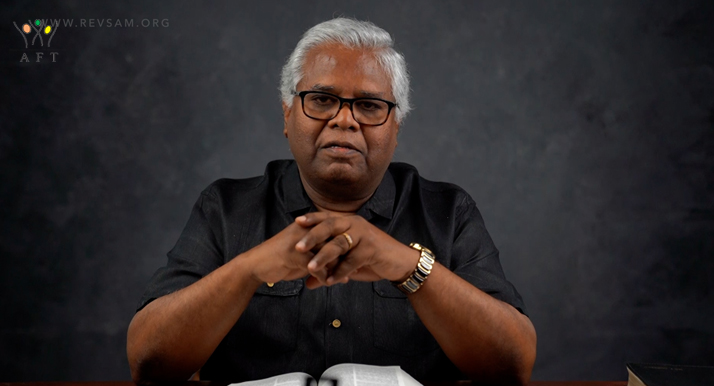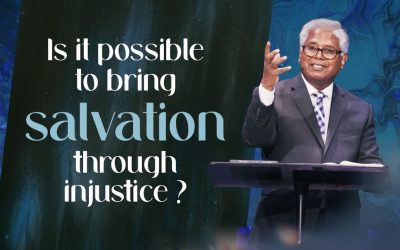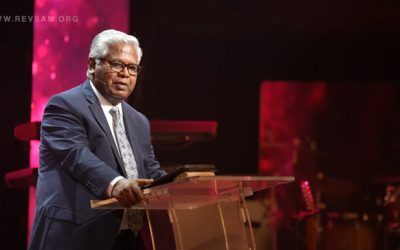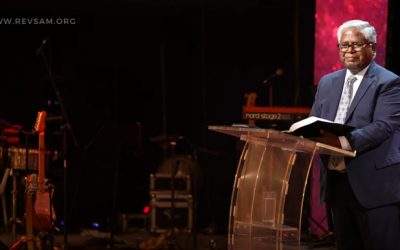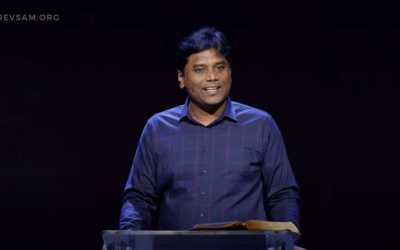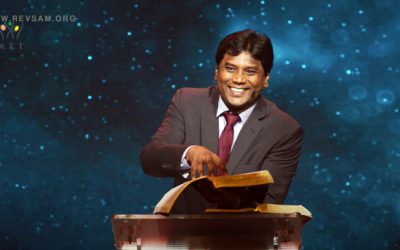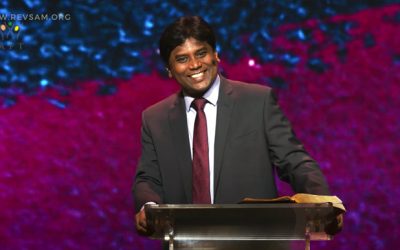
Abounding Grace (Vol 31) – The Lost Elder Son!
Sunday English Service – 31 JAN 21
Transcript
Now in this teaching, we went everywhere and then came to Luke chapter 15, where there are three wonderful parables of grace. The parable of the lost sheep, the lost coin, and the prodigal son. We’re now at the parable of the prodigal son. We’ve been studying the parable of the prodigal son for the last several weeks. The parable of the prodigal son must be rightly called as the parable of the two sons really, because it does not end with the story of the prodigal son, it goes on for several more verses, just talking about the elder son. He’s a very important aspect of this parable and that is where it climaxes. So I wanted today pay attention to the elder son and show you how the eldest son is also lost just like the younger son. We think about the younger son as the one that is lost, but the elder son who looks like he’s not lost is also lost. So let’s consider that today.
Now in the parable of the prodigal son, we saw how the youngest son demanded his share of the wealth from the father. So the father had to liquidate his portion and give it to him. So he walked out of the house, went to a far country and lived riotously and spent all his money, wasted away and came to nothing and then finally came to his senses and comes back to the father. And the father receives them surprisingly very gladly with an open arm, hugs him, kisses him, welcomes him even before he repented. So unconditional love is shown there in the father’s welcome. And the father arranges for a great feast. A fattened calf is killed and there is dancing and singing and celebration going on. Now, the story does not the end there. The story continues after the 24th verse, the story it could have ended right there, but it doesn’t end there, it continues.
Let me read to you from verse 25. Meanwhile the oldest son was in the field when he has come near the house, he heard music and dancing, so he called one of the servants and asked him what was going on? Your brother has come, he replied, and your father has killed the fattened calf because he has him back safe and sound. The older brother became angry and refused to go in. So his father went out and pleaded with him. But he answered his father, “Look, all these years, I’ve been slaving for you and never disobeyed your orders, yet you never gave me even a young goat, so I could celebrate with my friends. But when this son of yours who has squandered your property with prostitutes comes home, you kill the fattened calf for him.” “My son.” The father said. “You are always with me and everything I have is yours, but we had to celebrate and be glad because this brother of yours was dead and is alive again, he was lost and is found.”
Now, why does Jesus go on right after the prodigal son story to the elder son? Because Jesus wants to say something to the Pharisees. You remember in the first two verses that is the context of all that is going on in chapter 15. The first two verses are the most important verses here because there you see Jesus preaching, tax collectors and sinners gathering there. They actually came near to hear him. That means they came to the front seat and sat. And there is Pharisees and scribes watching and they’re critical of the fact that he received sinners into that meeting. And they’re murmuring, complaining about how he could invite these people in and so gladly accommodate them in a spiritual meeting. And in answer to their murmuring, in order to answer and tell them something about themselves, Jesus is now teaching and giving these three parables. So I would say that all three parables has to do with the Pharisees much. So he’s aiming at the Pharisees. The Pharisees is the ultimate goal of all these parables.
So what does he trying to tell the Pharisees? What does the message he’s trying to convey to the Pharisees? He is trying to convey the message that yes, that these people that you call sinners and tax collectors, yes, they may be lost and they may be bad and they may be sinners and unworthy people in some ways. But Jesus wants to tell these Pharisees who are critical of them coming into the meeting, he wants to say to them that nothing comes between you and God like morality and goodness and decency and respectability. These people because they thought they were so moral and so good and so decent and so respectable that that qualified them to come to God, that qualified them before God, they needed nothing else. They were not looking for God’s grace. They’ve forgotten about God’s grace. There is no idea of God’s mercy, God’s love, God’s goodness, God’s graciousness, none of that, all that has gone. Now, they rely completely on their goodness, decency and respectability and so on. So these people trusted in their own righteousness. They trusted in their own goodness.
And Jesus is trying to tell them, there is nothing that comes between you and God like morality and goodness. You are not able to come to God, he says, because of your goodness, because you think you’re too good. That is why you are not able to have a proper relationship with God, he says. In your heart, you are far away from God because you don’t see God’s grace. You don’t humble yourself before God, you are exalting yourself. You’re thinking of yourself too much. That’s the message he wants to convey. The purpose of the whole chapter, then it’s to aim at these Pharisees and tell them something and also to completely demolish all human misconceptions that we have about God and our relationship with God and about who we are and about morality and religion. There are all kinds of things that are in the heads of people, going on in their minds about who God is and how one can come to God? What qualifies one to come before God? What qualifies one for God’s blessings? There are all kinds of ideas about morality and religion out there in the world, and Jesus wanted to demolish all that and show that all that is wrong.
And he wanted to show that the only way is the way of grace to come to God. It is only by grace that you are accepted. And that is why the sinners are readily accepted. That is why he receives the sinners. And even the Pharisees and scribes, they need to come only by the grace of God, not by their goodness and not by their morality. Now this is a truth that has been highlighted in all of the revivals throughout the history if you look. The church has many times forgotten the gospel and has become cold and dry. It becomes cold and dry when they forget the grace of God, the message of God’s grace and salvation by grace, through faith, they forget that, and they preach more of morality and religion and decency and respectability and all of that. And they exalt that about the grace of God. And they make it look like that it is by their goodness and by their self-righteousness they can come to God.
When church reaches that kind of a place, then the church becomes cold because there is now therefore nothing to sing about, nothing to shout about, nothing to declare to the world about. There is no good news there. It becomes a so-called a gathering, or club of good moral upright people, and there is no place for the grace of God and the mercy and the love of God and so on. That’s the problem. And when the church becomes cold and dry like that, God sends the revival. There is an awakening through the Holy spirit, like it happened in the 1700s and 1800s and in the 1900s also, and then back in the reformation days also, when the church became all of a sudden vibrant by a real thrust of the gospel. And when that happens, usually what happens is that this kind of thing is put down, self-righteousness is put down. Our morality, our goodness is put down. God’s grace is exalted. The mercy and the loving kindness and the goodness of God is exalted. And as a result, people that are out there respond to the gospel and crowd into the church, and that really brings about a great revival.
During John Wesley’s days, it was going on like that, where the gospel was preached in the streets and preached in churches all over, and all sorts of people started coming. People that will never step into a church, started coming to church and they were being changed in those days. And during that time, John Wesley preached one time in a church called St. Helens Bishop’s gate, it’s an Anglican church. And as he preached and then got through preaching. And as he climbed down the steps from the pulpit, the man who was the secretary of the board in the church came running to him and said to him, “Sir, you must preach here no more.” He meant, sir, this is the last time you are preaching here, you are not welcome here, you are not allowed to preach anymore, you will never enter our pulpit again.
Now, why were people so offended? People were so offended by the real message of Jesus, because the real message of Jesus does not exalt our morality and our goodness, because that is never enough before God. Before God all are sinners, all have sinned and come short of the glory of God. Before God, all of these things are nothing. Our righteousness is as filthy rags before God. Only thing that counts is God’s grace. And everyone has to come by the grace of God in order to understand this message that Jesus is trying to convey to the Pharisees, we need to understand what Jesus is trying to say here through this parable and this portion of the parable about the eldest son. What do we learn here about the elder son? We learn here that the eldest son or the elder brother is also lost, just as lost as the younger brother. We always think of the younger brother has the one that is lost. That’s bad, therefore he’s lost, but Jesus is showing us here that the elder brother is also lost just as lost as the younger one.
Now, how do we know that? How do you know that he is lost? First of all, don’t forget that you have three parables here. And in every parable, the whole point is something is where it shouldn’t be. In every parable, the whole point is something is where it should not be. The sheep is where it should not be, it’s lost. The coin is where it should not be, it’s lost. The prodigal son is not where he ought to be, he is lost. And in every parable, you have someone going out to get it back for the sheep that is lost, the shepherd goes out to get it back and finds it. For the coin that is lost, the woman goes and sweep the house and finds the coin. For the son who’s lost, the father is waiting as he sees him come, he runs to the son and receives them with gladness. The lost son finally comes home. But then the story is not over. What happens next? The father who went out to get the young son now has to go out once again to get the older son. You’ll find that in Luke 15 verse 28 in the last section of verse 28. You see the father going out after the older son, because he’s just as lost as the prodigal son. He’s just as lost as the coin or the sheep. Do you see that?
The younger son left home and he got lost. This one stayed home and he was lost. He was right here at home with the father, but yet he was lost. Outwardly, this fellow did everything right but inwardly he wandered away from his father in his heart. So the point is, he’s lost and it’s a very important point. Now, what does that mean? Jesus is saying to the religious and moral people, the Pharisees and the scribes that were in the audience as he was giving this parable, he is telling them, you are as lost as the prodigal son in this story. And literally he’s telling them because they criticize these sinners, the people like the prostitutes and so on and the tax collectors. So he’s saying literally, he’s telling the Pharisees and scribes, you are as lost as the tax collectors and prostitutes. The people that you are criticizing, that’s the message that he’s giving. You as lost as them.
Now in verse 31, we see the father coming out and talking to the elder brother and he’s pleading with him, pleads with him means that he talks to him very tenderly. He says to him, “My son, you are always with me. My son, you’re always with me.” When people read this, they say, see, he’s been with the father always, he’s not lost. You’re just saying he’s lost, but he’s not lost. He’s been with the father. But Jesus is really saying no, he’s so lost, that’s what I want you to see. He is with the father yet he is lost. It’s possible to be with the father, right where the father is and be involved with the father and still be lost. And Jesus speaks about it over and over again. For example, in John’s gospel chapter for 14 verse 9, Phillip says something way off once and Jesus says to him, “Have I been with you so long, and you still do not know me, Philip? Have I been with you so long, and you still don’t know me, Philip?” He says. So it is possible to be with Jesus for a very long time, be very close to him, be right there with him and not know him.
There is even better example in Matthew’s gospel chapter seven, verse 22, it says on the last day, people will come to me and say, “Lord, Lord, didn’t we do mighty deeds in your name. Didn’t we prophecy in your name. Didn’t we do miracles in your name.” Jesus will say, “I never knew you.” Is it possible to be doing miracles, mighty works and be prophesying and be involved in ministry in such a way, and still be far away from God? Be active in the work of the church and still be far away from God. Still be far away from the father so that he says, I never knew you? It is. That’s what Jesus is trying to say.
This guy, this elder son, he was right there. He says, “I’ve never disobeyed an order. I’ve always been there. I’ve slaved. I worked for you. I’ve never done anything wrong.” He says, but he’s utterly lost. So you can be right there. You can even be very busy with the father’s work and still be lost. That’s a very shocking thing. I think people are hearing him must have been really shocked at what he’s trying to say. Let me put it another way. The elder brother has been with the father, but he does not know the father at all, does not know father’s heart at all. He’s been involved with the father. He is doing business with the father. He’s right there in the same house. He’s following the father’s orders. He is doing everything, but he does not know the heart of the father, because if he knew the heart of the father, he would have along with the father accepted the younger brother as he came in. If he understood the heart of the father, he would have behaved differently. But he does not understand the heart of the father, does not have any understanding of the father. So Jesus is really saying, you could be right there, be very spiritual so to speak like the Pharisees and the scribes, be known as spiritual people, but still be lost, completely lost. Don’t even have nothing to do with God. It’s still be right there. It’s possible, he says.
Secondly, the elder brother is in fact more lost than the younger brother. That’s was he’s trying to say. He’s wanting to shock them beyond anything that they can think of. He is trying to tell them they are more lost. In other words, he’s trying to tell the Pharisees and the scribes that are in the audience, look you’re criticizing the prostitutes and the tax collectors that are here. You look down on them, but do you know you’re just as lost as they are and I want to tell you, you you’re even more lost than they are. Yes, they are lost. Yes, they’re bad. Yes, they’re not living right. But you are even more lost. Just imagine what this message you would have done for them. So what do we mean when we say that they are more lost? You see lost is lost. Like dead is dead. If a lion came and attacked you and tore you on to pieces and threw your body parts everywhere, that’s dead. You’re dead. But if a black widow spider came and bit you while you’re sleeping and, in your sleep, if you died without even knowing that something bit you, that is also dead. Both the guy that died because the lion attacked him and the guy who died because the black widow spider attacked, both are dead. One is ugly dead and another is pretty dead. That’s the story here.
The younger brother is the ugly dead. He went out and wasted his life and it was there for everyone to see, it was an ugly scene. It’s like the lion tearing the body into pieces and throwing everywhere. Everybody in the world knows the prodigal son was a bad son and he got wasted away, and everybody laughs at him. That’s the way his life goes. He was dead. But the elder brother is the pretty dead. He looks all right. He looks like there is nothing wrong. He’s still in the father’s house, eating well, he is not in the pig’s stay. He is eating well, he’s dressed well, and he’s got sandals on. He’s got the ring on, he’s got the robe on, he’s got everything on. He’s got all the wealth and everything, but still he is lost. So what is Jesus trying to say? He is trying to say this, listen to this. The message is this.
The elder brother is not lost in spite of his goodness. It’s not that he is good, but yet he is lost, no, that’s not the way to look at it. He is lost, because of his goodness, it is because of his goodness, he is lost. That’s what he’s saying. Now, how do we know this? How do we know that he’s lost because of his goodness? Why doesn’t he understand the father here? Why is he angry at the father? Why is he talking like this? I have obeyed you, and I’ve never disobeyed you. And I’ve slaved for you and all that. Why is he talking like that? He’s talking like that because he feels he’s been so good, but he has not been treated right. It is his goodness that is getting in between him and God. Do you see that? How can someone be lost because he is good? This is definitely one of the main teachings of Jesus Christ. This is a teaching condemning the people that believe in their morality and their goodness to get them to God, people who trust in their self-righteousness in their own righteousness. It’s a very important teaching of the Bible. It’s a teaching in very simple words that these people are lost because they are good. It is because they are good. It’s very difficult to preach the gospel to them because they believe they’re all right.
I remember one time I preached in a wedding and I was getting done, one fellow came in there and he was all drunk and I could smell it as he approached me. And he is all in suit and tie and everything, and he came to me and he said [Foreign Language 00:21:50] And I was preaching the gospel in the wedding service. And he said, “[Foreign Language 00:21:57] what you preach today, you need to preach to those people that are out there, drunk and rolling in the street and that kind of people, they are the sinners. Here, we are all Christians. We are all Christians for four or five generations. And you’re preaching to us the gospel.” He says. You see where he’s at? He thinks that he’s morally upright, he is decent and he’s respectable and he’s a bit educated. And therefore, everything is all right with him. He is acceptable to God, he thinks. That is the thing that Jesus condemns here, these people that look at their own goodness and their morality as something that qualifies them before God. As the gospel gets recovered during these revivals and awakenings that happened in history. This is the truth that comes alive. The truth about God’s righteousness and the condemnation of self-righteousness. It is a salvation by grace and through faith.
For years and years, sometimes church never preaches that church leaves that and never touches on it, but Jesus always speaks about it. Jesus says to the Jewish leaders, he says the prostitutes go into the kingdom of God before you. Can you believe that? The prostitutes go into the kingdom of God before you, he says. He says, “When John came and he preached, none of you believed, but the prostitutes and tax collectors believed him. And yet you never believed.” He says. So what he’s saying is the thing that separates you from God is not so much our sin, but our good works. It’s nothing wrong with good works. Good works are good, but it separates us from God when we trust in our good works to get us to God. When we trust in our good works to qualify us before God, that’s the thing that he’s finding out too. Now, how could your goodness separate you more from God than your badness?
Now, let me give you two answers. First, it’s separates you from God. Your goodness separates you from God more than your badness, because your goodness hides the problem that you have with God, it hides the fact that you don’t have a proper relationship with God. What is sin? Sin is this your own Lord and your own savior. Sin is the rejection of God from your life. That’s the way the Bible teaches about sin. And when you look at the younger brother and his lostness, and how he’s lost, you can see it very plain and clear. The guy comes to the father and says, I don’t like you, I don’t like living here, I don’t like your values, I don’t like this family, I don’t like your faith, I don’t like your religion, I don’t like anything that you have, I want to go my way. And I want to live my own life, I don’t like you telling me all the time, what is right and what is wrong? I want to live my own life. I don’t like you all. I want to go out and live my own life. And he picks up his bags and gets his money, all his wealth and walks out of the house and is playing and clearly, he goes and wastes himself and becomes like beggar and then comes to the senses and comes back. Everybody knows it. It’s open for everybody to see.
They save when there’s smoke, there’s fire. And you know when you see the smoke in this guy’s life, you know where the fire is. And when his life falls apart, he feels like he needs to go back to his father. He has done a mistake, terrible mistake, a blunder. He needs to go back to his father, humble himself and asks his father talks up to him. So his problem is very clear, but the older brother’s problem is different. Older brother has goodness on his side. Therefore, that goodness masks the fact that he’s got a problem, that’s his problem. This guy doesn’t depend on God. He actually doesn’t need God because he’s so good. He doesn’t need God’s grace, God’s kindness, God’s goodness. He doesn’t have to pray. You only pray when he’s in big trouble and when life becomes bad and nothing is working and life is falling apart and there’s smoke all over, you can’t find the fire, you don’t know what is wrong. He says, what a nice guy, what a decent guy, but everything is going wrong in his life.
His goodness is hiding the fact that that is a relationship problem that he has with God. His goodness is hiding his sin. He’s prayed, he’s trust in his goodness, his self-righteousness, his goodness is hiding that. His good works is hiding that. The younger brother’s lostness says very clearly it declares, I set my heart on the wrong things, now I realize that these things will never satisfy therefore I’m going to pick up my bags, go back to my father, repent and go back. That’s the younger brother, the older brother’s lostness. He also set his heart on the wrong things. Not on the same wrong things as the younger brother, the younger brother went out and had fun in another way. But the older brother stayed at home, but he’s also get set his heart on his share of the wealth that the father had. And he had no relationship with the father. He didn’t never understand. The father never bothered to understand the father.
He set this heart on the wrong things that he considered those things more important than his father and his relationship with the father. And therefore, when things didn’t work out, he blames the father. He says “I’ve been good, but you have not been good. I’ve been good, but you didn’t do me right.” That’s his attitude. So we saw why goodness separates you more from God than badness, because it helps to hide the problem that you have with God. Secondly, it not only helps to hide the problem that you have with God. Your goodness also becomes your main weapon in your battle against God, so that you use your goodness against God. That’s why this guy is speaking like that. I’ve slaved for you. I didn’t disobey your orders. I always did it right, but you never even gave me a goat, but you give this guy a fattened calf. He’s using his goodness against the father. He’s saying I’ve been so good, but you’ve been not right with me. You didn’t do me right. That’s his attitude. He is using it as a weapon, his goodness has become a weapon in his hand to attack others and attack God.
He uses his goodness to attack his brother. He says, “He went out and spent all the wealth on the prostitute, this son of yours.” He feels that it is owed to him and that it is his right by virtue of his goodness that he be treated right. So he wants to claim his right. Now, if you want to understand the difference between the elder brother and a Christian who understands that he saved by grace, the difference between the elder brother attitude and there’s other attitude where you understand that you’re saved by grace. The difference between grace and work is religion. If you want to understand it, the best place to go to is, The Great Divorce, a book written by CS Lewis, a famous writer, where in an allegorical tale, he deals with biblical subjects of good and evil, race and judgment and so on, a wonderful way.
The story is an allegorical tale about a busload of people going from hell to heaven. And they go to the outskirts of heaven and people from heaven come and meet them. These people were known to the people from hell that were in the bus when they were on earth and they’re friends, but they are in heaven. They come out to meet them. And there’s a conversation there going on between two people. One is called the Ghost and he’s from hell, and the person from heaven is called the Bright man. The Bright man and Ghost, Bright man is from heaven, Ghost is from hell. And Ghost says, “Look at me now.” And he slaps his chest. “I’ve gone straight all my life. I don’t say I had no false, far from it, but I have done my best all my life. I’ve done my best to everyone. That’s the sort of chap I was. I never asked for anything that wasn’t mine by rights. If I wanted a drink, I paid for it. If I took my wages, I done my job, then only I took my wages. That’s the kind of person I was.” You can understand this guy comes from the works viewpoint, goodness viewpoint. He believes in his works and his goodness, but he’s from hell.
The Bright man said, the one from heaven. He says, “It would be much better not to go on about that now. Don’t talk like that now.” He says. Because things work differently here. You can never talk that and get by here. “That don’t work.” He says.” And Ghost says, “I’m not arguing.” He says. “I’m asking for nothing but my rights, but I got to have my rights, the same as you got to have your rights.” He is telling the guy from heaven, “I got to have my rights just like you got to have your rights.” And you know what the guy from heaven says? He says, “Oh no, it’s not as bad as that.” In other words, he’s saying if I had what rightfully belongs to me, I would be having something bad, man. So it’s not as bad as that. I haven’t got my rights. In other words, he says, “I didn’t get in heaven what I deserved. If I got what I deserved, I should not be here.” He says, “I didn’t deserve heaven. I wouldn’t be here in heaven. If I got what I deserved. You will not get yours either.” He’s telling him. “You’ll get something far better.” He says. He’s talking about grace.
And the Ghost says, the guy from hell says, “That’s just what I say. I haven’t got my rights. I always done my best. I never done nothing wrong. And what I don’t see is why I should be putting below a murderer like you.” This guy is in heaven is a murderer before when he was on this earth. “I don’t understand why you’re up there and why I’m down here.” He says. The Bright man says, “Who knows whether you will be.” Because the guy said, I don’t understand why I should be below a murderer like you. The guy from heaven says, “Who knows whether you’ll be. Who knows whether you’ll be below a murderer? Maybe you’ll be put above me up there, only be happy and come with me.” He’s pleading with him, “Come with me, trust me, don’t be talking this nonsense, just come with me.” He says. Ghost says, the guy from hell says, “What do you keep on arguing for? I only want my rights. I’m not asking for anybody’s bleeding charity.” And then the man from heaven says, “Then do at once ask for bleeding charity, everything is here for the asking and nothing can be bought. Here everything works upside down, here nothing can be bought. You cannot use your goodness as a currency here to get something. Here you have to ask, ask for charity, ask for grace, ask for mercy.
Ghost says, “That may do well for you. If they choose to let in a murderer, all because he makes a poor mouth at the last minute, that’s their lookout.” He is saying, “Well, you murdered somebody and the last minute, you cried out to God and said, have mercy on me God, and you are in heaven. They heard your cry in the last minute, and they let you in heaven.” He says, “That’s their lookout. I don’t want charity. I’m a decent man, and if I had my rights, I would have been there long ago and you can tell them that I said so. And the Ghost was almost happy now that he could, in a sense, threaten saying, “That’s what I’ll do, I’ll go home. I didn’t come here to be treated like a dog. I’ll go home.” And he goes out, goes back.
Now this is the perfect picture of the elder brother, wonderful picture of grace and works in religion. He says, “I want my rights. I just want my rights. I don’t want your charity. I want my rights.” He’s demanding, using his goodness, he’s demanding his rights everywhere. He’s coming to the entrance of heaven. He’s saying, “Tell God that he needs to allow me in. Tell God that all I want is my rights. How can a murderer be there and me be in hell.” But yet they realize that his goodness is the thing that kept him away from God. Why? When we all come to Christ, we repent of our badness. The things that we have done wrong. But do you know that you have to repent of your goodness also in the sense that you have to repent of your self-righteousness, that you’ve trusted in your righteousness, you felt that your righteousness was good enough to get you to God and that you are better than others and so on. You have to repent of that. People say, “How can I open up my goodness?” If you only repent of your badness and not your goodness, then what’ll happen is you’ll be a person like the elder brother, because he will be always talking about how good you are, how great you are, how you’ve never done anything wrong and how you’re not like that. Now you’ll never do this and never do that. And how that you are perfect and all that. And by doing that, you’re showing yourself as an elder brother, you’re identifying yourself as an elder brother.
There are some marks that clearly identify a person as having an elder brother lossless syndrome. What are the signs of an elder brother lostness? Let me go through some of them very quickly. The elder brother is different from the younger one. You won’t find the elder brother in the pig stay. He’s not going to get dirty. He’s not going to lose everything. All the money he’s got and he’s not going to roll in the mud and the slush. And he’s not going to become a beggar. No, he’s fine. He’s in the father’s house, eating well, dressing well, and so on. I said this because some people say, well, you can identify a sinner, who a sinner is, very quickly. If on a Sunday morning, if somebody is out in the street and not in the church, then that’s a sinner. Well, I tell you, the elder brother is in the church, he’s with the Bible, he’s active in the church. He’s busy in the church. He is doing this and that in the church, that’s the problem. You can identify him like that. If you’re looking for that kind of a category, you’ll miss him because he’s right there, he’s looking just right. He’s got the right kind of haircut. He’s got the right kind of clothes, the right color of clothes in, everything is right. He is in the church. He looks very spiritual. He is the Pharisee, but he’s lost.
So how do you identify the elder bother lostness? One, you can identify by the fact that they are very angry, the way about the way the life goes, and they compare themselves to others. They’re very angry about the way their life is going. And they’re always comparing themselves to others. Look what the elder brother does. He says, “I never even got a goat, and he gets a calf.” Goat is supposed to be much cheaper than the calf. So he says, “I’ve never even got a goat, but that fellow who went and wasted your property among prostitutes, you give him a calf.” Just like the fellow from hell said, “You’re a murderer, how are you in heaven and I’m down here?” That’s the kind of attitude. That’s the elder brother, sign of elder brother lostness. Now we’re usually angry in two ways. We have two kinds of anger because they believe that people can belong only to two different categories. One of two categories, that is you can either be good and therefore valuable, or you can be sinful and therefore worthless. You get me? There can be only two kinds of people, two categories of people. Good and therefore valuable. Sinful that is bad and therefore worthless. But the gospel is completely different.
Now listen to me, what the gospel says is that you can be sinful and be incredibly valuable. That’s the gospel. Isn’t that something. And the elder brother who thinks in these two categories, he thinks you can be that good and valuable or sinful and worthless. He gets two kinds of angers. You know why? Because he believes he’s so good, and therefore he so valuable. When things go wrong in his life, things don’t work out well. He’s very angry at God. He said, “Why God, why me? What did I do wrong?” Have you ever seen people talk like that? That’s an elder brother syndrome. That’s an elder brother lostness. Why did God do this to me? What’s wrong with me? I’ve never done anything wrong. I’m going to ask God when I get there. Why he did this to me, that’s an elder brother syndrome. That’s because he feels that he is so good. And therefore, he so valuable. That’s the problem.
The other kind of anger also he gets when sometimes he feels like he has not lived up to his standards, the best standards, the Pharisaical standards. And when he knows that he has been not so good. And when things don’t go right, then, then he gets angry also, but not with God this time he gets angry with himself. He calls himself a fool. He says, “How can you do this? How can you fail like this? How can you make a blander like this?” So he beats himself down. So he’s angry at God or he’s angry at himself. He’s angry at God because he feels he’s so good, and therefore he’s so valuable and God has not treated him good. On the other hand, sometimes he doesn’t feel like that he’s so good, therefore he’s worthless, and therefore he condemns himself and puts himself down. But the fellow who is saved by grace and understands the grace of God is totally different. The grace of God completely brings you out of that scheme. You don’t fit into those two categories. The grace of God says that you can be imperfect sinful, but yet be so valuable in the sight of God. That’s what the grace of God says.
Yeah, we’re all not perfect. Whose they’re perfect in this world? We’re all not perfect. But yet the amazing grace of God says that we are absolutely valuable in Christ. That Jesus died for us. That’s our value. He gave his life for us. He loved us. Will he not give us all things? That’s the way the Bible preaches it. So it’s amazing, isn’t it. Secondly, you can identify the elder brother kind of people by the fact that they hate the law that they’re obeying. They obey the law, but they hate it. Isn’t that something? They obey the law, but they hate it. You see it in verse 29, very plain and clear. He says, “I’ve slaved for you.” Look at his attitude, obeying the law of God means slaving. He says, “I’ve never disobeyed your orders.” Look at the word orders, commands, some translations say orders. So the thing about the people who believe they’re saved by obeying the law is this, they’re always on the surface law abiding and underneath it all, there are law hating.
On the surface, they’re law abiding. They look like they go by the law. They abide by the law, the laws of God. But underneath it all, they are law hating, they do it, but they hate it. They do the laws of God, but they hate it. You may not understand it yet, but let me give you an example. I remember when I was studying, I went to Bible college. I don’t think there was so much to study from the Bible, because from the kind of background I came from, even going to a Bible college was considered sinful in those days. You just stand on your knees and you learn from God. That’s what they said. But I ended up going to a Bible college. And I didn’t think there was much to study. I thought to become anything else in any other profession, you need to study, but for preaching, you don’t need to study anything. You just stand up and something will come on you and you just preach. That’s the way I thought about it. And I believe these guys, what they told me.
But when I went there, I had a tough time because in the college, every course, the first day, they’ll give you a sheet of paper, every day’s lecture will be mentioned there and it’ll tell you what you need to read before you come to class. They’ll give you pages from so many different reference works to read, 10 pages here, 15 pages there like that. You need to read it two or three or four different sources and take your notes and be prepared mentally to handle that subject, and then you come to the class and then you hear the lectures then only you’ll understand. So it got to me, because I was never used to reading so much. I liked music and singing and that kind of thing. And I try to study as little as possible and get as much as possible by way of marks, so I can pass. That’s the way I got along through life. And when I went to Bible college, I thought that shouldn’t be difficult, but it was difficult. I went there and I learnt, first of all, that’s the most difficult subject in the world to study. You don’t understand it very easily.
Now it’s breaking my head first few days, and it was such a drudgery for me, painful for me, too much work for me. So I hated it, but I did it because I had to do it. I got to do something. I got to finish this education. I got to make something out of my life. So I had to do it. So I hated it, but I did it. But while I did it something began to change in me, because as I was reading, I found some of the most amazing truths. I began to understand the Bible for the first time in a way that I’ve never understood. I never thought that these things existed, that such kind of writings existed, never read anything like that. Amazing. I’ve always read the Bible in our home, we read the Bible, and so they’ve kind of inculcated this thing in us. I knew the Bible, but I never read this kind of explanations, and expositions. And I got excited. I wanted to learn more, more and more, more and more, then that drudgery turned into great interest and hunger and thirst.
Now, I did it because I liked it. I wanted it. I thirsted after it. There’s a difference. The difference between the elder brother and the Christian who saved by grace is this. The one with the elder brother mentality, he obeys the laws of God, but he hates it in his heart. He has to obey it because they told him in his church, if you don’t obey it, you go to hell straight. So he obeys it, but he hates it. But that Christian who understands that he’s saved by the grace of God, he is not obeying because if he doesn’t obey it, he’s going to hell. No, he’s obeying it because he loves it, because it’s changing him, it’s making him wonderful, it is making his life completely different. He tried everything to change himself, he could not change himself, but the word that created the world is now coming into him and changing him. So he’s doing what the word of God is saying. See the difference.
A Christian can really speak like in Psalm 1, where it says, his delight is in the law of the Lord and he meditates in his Lord day and night, a Christian, true Christian loves to meditate in the law of the Lord day and night, but elder brother type, he obeys the law of God, but he hates it, when it’ll be over. Oh, I hope I did it. I hope I qualify. I hope that’s enough. I’ll do the [inaudible 00:49:21] to just to get by. Psalm 119, the Psalmist says, “I love thy law, it is sweeter than honey to my mouth.” That a grace person says. That’s impossible for the elder brother to say.
Thirdly, another thing that identify elder brother is, in the elder brother lostness, there is a lack of joy and assurance. And on top of it a tremendously judgmental spirit towards others. Lack of joy and assurance. There is lack of assurance is something that you see here in the elder brother. He says you never gave me a goat to party with. And the father says, “All I have is yours. You’ve always been with me.” What is the father saying is actually saying, but son, you never asked me, why did he ever ask the father to give him a goat so he can party, he has never partied before. He’s never had singing. He’s never had dancing. He’s never enjoyed. He’s never done anything like that. There is no dance in his heart. There is no joy in his heart. And he’s grumbling here about how he’s never had a goat given to him. Father says, you should have asked me, I could have given you all the goat you want.
He never asked for a party, he never asked for a goat. Why? Because he doesn’t really know where he stands with the father. He doesn’t have even the freedom to ask the father. He doesn’t even know what will happen if he asked the father. He doesn’t even understand where he stands. There is a lack of assurance therefore there is no sense of joy. He has never had a party. He’s never had a dance in his heart, he is never had his heart leap for joy literally. Not only there is a lack of assurance and lack of joy, he’s also very judgmental. He doesn’t understand where he stands with the father, but he knows where the younger brother stands and where he should be. He’s not qualified. He knows that he’s unqualified to come into the house and be a part of the family. He knows that for sure. He doesn’t know where he stands. He’s not even coming into the house. He’s not even having the freedom to ask the father for a goat. He’s not even having the thing to go ahead and have a party and celebrate the life that he has.
The wonderful life that he has always had. He doesn’t even have that kind of thing, because he’s unsure of his standing, but he’s very sure where his brother should stand, he is unqualified, he shouldn’t belong to the family. That’s the way some people are. That’s the elder brother spirit, but if you’re a Christian and you’re saved by the grace of God and you understand the grace of God and that you are imperfect, but God’s grace is perfect and you’re saved by God’s grace, you become very incredibly sure about yourself. You look at your own heart and you see things that are not right. That are not perfect. You’re not rattled by it. You are comforted by the fact that Jesus has done everything for you and that God is at work in your life, that he’s changing you and that you are existing and living only by the sheer grace of God.
You understand that you are not perfect, but you understand that you are very valuable in the sight of God, that God loves you. And when you look at other people, you are very, very charitable and gracious. That’s what a true Christian is like, please listen. A True Christian is very charitable and gracious towards other people. Why? Because he understands, yeah, he’s not so perfect but thank God for the grace of God. Thank God for the goodness of God. God is working on him and if we pray more and if we just uphold him more and help him more, he will come up and he will do all right. That’s what grace does. You become the most unjudgmental person in the world. You begin to have some toleration. You begin to have acceptance. You receive people. Pharisees were condemning Jesus because he received the sinners and he ate with them. There is a tremendous inclusivity about grace. And look at how Jesus portrays God in the story.
The father killed the fattened calf and the fattened calf is much more than a goat. To eat the meat from the fattened calf, you need to have a lot of people, just having your house and your relatives and your people that work for you is not enough. You need to invite a lot more people because there’s a lot more meat. So some commentators say he would have invited the whole village where he was living. Everybody out there must have been there. And those people are the people before whom he was shamed by the younger son, as he walked out with this property. Those people laughed at him, those people are the ones that criticized him for not being a good father. Those people are the ones that talked about his failure and all of that. And even now as the way he received the son, they would have thought that he’s useless man. Look at him. The son comes like a beggar and he goes and hugs him and receives them. And doesn’t even demand anything from him. Unconditionally loves him. Doesn’t demand repentance. What kind of a father is he? They’re criticizing him. He says, “Never mind, you come and eat.”
That is the way that Christians are. Christians are people who say to others, well, you may not believe what I believe, but nevertheless, you come for the feast, I will eat with you. That’s why Jesus made it a point to eat with the sinners. I’ll eat with you. Maybe I will not convince you of my position, but I’ll at least help you see what I see. Maybe I will not be able to change you, but I’ll help you see what I see, but I’ll never take a stance that I’ll say I’ll never eat with you, I’ll eat with you. That’s the whole point that Jesus was making there. They were accusing him of receiving sinners and eating with sinners. And Jesus says, yeah, you’re right. I will eat with sinners. I will receive the sinners, nothing wrong in that. I will receive people who thought that I was bad. I will receive people who thought I’m not right. I will receive all kinds of people; I’ll eat with them.
There is a tremendous inclusivity about grace. That’s the beauty of grace. So the goodness is worse than the badness. You can see that. That’s the problem with the Pharisees, the comparison between the sinners, tax collectors and the Pharisees and scribes is this, the sinners and tax collectors are about badness and Pharisees and scribes are about goodness, which is better? Which is worse? Jesus says the Pharisees and scribes are worse. That keeps people away from God, more than the sinners and the way they are, the badness that they have, because the goodness is the thing that makes you bitter. The goodness is the thing that makes people worried, because they’re worried about why God has done this and that to them, they’re bitter that God has not treated them right, and they have been so good, but they have not received what is just.
It’s the goodness that makes you hate obedience. They obey but they hate it. It’s the goodness that makes people miserable. It’s the goodness at the heart of all problems. When you trust in your goodness. There’s nothing wrong with goodness, but when you begin to trust in your goodness, instead of God’s goodness, and understand the grace of God and live by the grace of God, instead of doing that, you trust in your goodness and take pride in your goodness and consider yourself better than others. That’s the way it goes. The goodness problem is this, that it always makes you put up your nose against others. And you think you are much far better than the others, that’s the problem. Self-righteousness, that’s another word for goodness, better word I think, able to understand it more self-righteousness is the cost of racism, classism, curstism, all these evils. Self-righteousness, I’m better than them. That’s the thing. That’s the reason for the breakdown of families. That’s the reason for breakdown of relationships and so on.
Finally, let me say this and close. The elder brother types are people that have the elder brother lostness are people that will not invite others into the family of God gladly. They will not receive others into the family of God gladly. They’re exclusive, grace is inclusive, grace invites, welcomes, receives, but self-righteousness keeps people out. I have dealt with a lot of that. You see a lot of that in the modern world also. Self-righteousness keeps people out. You will see it in churches. You will see in communities, you’ll see it everywhere, self-righteousness. Some people would say, “Well, I don’t like these people in the church because they have too much hair. Look at that boy, he’s got to be long hair. Look at his head, it’s standing like this. Look at him, he’s got colors in his hair. Look at how he’s done his hairstyle. I don’t like these kinds of people in church.
And if you go and solve it and if you get it right, then they say, I don’t like the way he sings. He’s shaking too much when he sings. He is jumping too much when he sings. I don’t like the songs he sings, something they don’t like. What they’re thinking is they should completely become like them, like a 60-year-old man, get the haircut right, wear that kind of clothes, comb your hair like them and become like them. Then they will accept them. That’s the idea. My way is the best way, no other way. That kind of attitude. That’s the elder brother attitude, terrible, when you see people like that, you can see that’s the elder brother syndrome. Elder brother lostness, they’re lost. This attitude keeps them away from God literally. One of the greatest things in Christian life that we can learn is that we can receive people of all kinds. They’ll be little different, yeah. How do you anger people in your home? Have you ever raised a teenager, have you ever had teenagers in your home, how do you deal with them? Are you going to say to them if you have long hair, don’t come into the house? Is that the way you deal with them?
All the time, do you condemn them? All the time, you belittle them. All the time, you bad mouth them. Is that the way you deal with kids? I’m sorry to say. That’s not the way to do it. Some of the things that they do maybe wrong, but you don’t completely throw them out for that. You’ll begin to tolerate them, begin to slowly shape them and form them and be with them, receive them, accept them, love them and help them. That’s the way you do it. That’s the way Jesus is talking about. That’s the thing that is missing in the Pharisees and the scribes. That’s what Jesus is addressing here. So important to see. And I hope everyone catches it today. Sometimes we need to identify whether we have become like that. Sometimes we become like that unknowingly, we have these attitudes creeping into us. The devil gets in, turns our minds like that, so that we become critical of these things and instead of receiving people, tolerating people, receiving people, praying for people and helping people and bringing people into God’s family and helping them to assimilate where people that reject them. That’s very bad.
What a message Jesus is giving. All in response to that murmuring because the Pharisees and scribes murmured, because there were tax collectors and sinners like the prostitutes and so on. We’re critical of that and Jesus says, hey, you got a bigger problem than what they’ve got. At least they’ve come and taken the front seat, they’re eager to listen. Maybe they’ll change if you give it some time, if you’d be gracious enough, if you tolerate, they will change. They’ll turn around how many people turned around in Jesus’ time. How many people are turning around today? Maybe if you’ll just keep quiet and just love them and pray for them, they’ll change. You got a bigger problem. You’re farther away from God. You are distanced from God, more distanced from God than they are. It’s more difficult for you to come to God than for them to come to God, they really come to God because they are humble, they know they’re sinners, they know they’re lacking there, they know they’re wanting. Your problem is you think you got it all, he says. That’s the message. Thank God for the gospel. The gospel sets us free. The gospel makes us effective. The gospel makes us successful in this world. The gospel makes us people that can reach out to people and help people. Amen.
How to live by faith during evil times? | Habakkuk 1:1-17 | Sam P. Chelladurai | 7-Jan-23
தீமைகள் நிறைந்த சூழ்நிலைகளில் விசுவாசத்தினால் வாழுவது எப்படி? | Sam P. Chelladurai | 7-Jan-24 | AFT
தீமைகள் நிறைந்த...
தேவன் பேசியிருக்கிறார்! நீங்கள் விசுவாசிக்கிறீர்களா?
தேவன் பேசியிருக்கிறார்!...
God has spoken! Do you believe it?
God has spoken! Do you...
ஆராதனையின் புதிய ஏற்பாட்டு அடிப்படைகள்
ஆராதனையின் புதிய ஏற்பாட்டு...
New Testament basics of Worship
New Testament basics of...
இயேசுவில் உள்ள தேவ மகிமையை ருசித்துப்பாருங்கள்! (பகுதி 2)
இயேசுவில் உள்ள தேவ மகிமையை...
Taste and see God’s glory in Jesus! (Part 2)
Taste and see God's glory in...
இயேசுவில் உள்ள தேவ மகிமையை ருசித்துப்பாருங்கள்!
இயேசுவில் உள்ள தேவ மகிமையை...
Taste and see God’s glory in Jesus!
Taste and see God's glory in...


